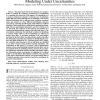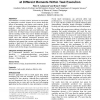4420 search results - page 40 / 884 » Evaluating a Computational Model of Emotion |
TSMC
2008
13 years 7 months ago
2008
This paper deals with the development of a computer model to estimate the subjective workload score of individuals by evaluating their heart-rate (HR) signals. The identification o...
CHI
2004
ACM
14 years 8 months ago
2004
ACM
Facial affect (or emotion) recognition is a central issue for many VMC and naturalistic computing applications. Most computational models assume "categorical perception"...
COLING
1996
13 years 9 months ago
1996
This paper presents a unified theory of verbal irony tbr developing a computational model of irony. The theory claims that an ironic utterance implicitly communicates the fact tha...
ATAL
2008
Springer
13 years 9 months ago
2008
Springer
The context of this work is the search for realism and believability of Virtual Humans. Our contribution to achieve this goal is to enable Virtual Humans (VH) to react to spontane...
CHI
2004
ACM
14 years 8 months ago
2004
ACM
User attention is a scarce resource, and users are susceptible to interruption overload. Systems do not reason about the effects of interrupting a user during a task sequence. In ...


